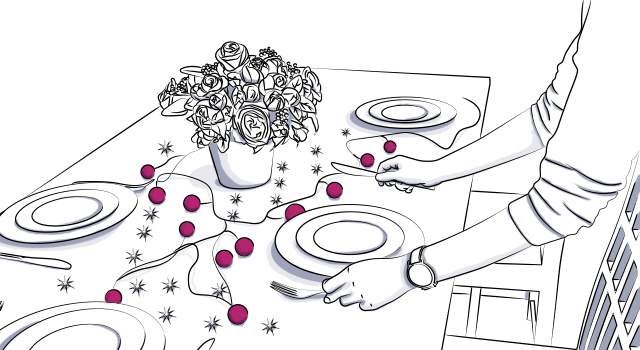
5 Critical Catering Director Skills for Modern Events
Catering directors have complex jobs that require wide-ranging skills. Food and beverage knowledge, business skills, and people skills. It’s a fast-paced job that isn’t for the faint of heart”when the ingredients for a feast aren’t in the food delivery, finding a solution is the catering director’s responsibility.
Read on to learn what a catering director does during their workday (and night!), how much they make, and the essential skills of an outstanding catering director.
The skills of a catering director go beyond managing the staff in the kitchen and the banquet hall. You make sure the menu is served up beautifully, cleaned up thoroughly, and everything in between. You’re in charge of people, scheduling, F&B budgets, suppliers, and contracts. You make sure your staff follows health and safety best practices without fail. And you do whatever you can to meet client and customer satisfaction.
A good catering manager/director must have the ability to wear many hats. You aren’t a chef, but you’ll be involved in menu design. You aren’t a typical office manager, but you must be adept at managing budgets. You must be an excellent communicator, to staff and customers alike.
˜Catering manager’ and ˜catering director’ are essentially interchangeable terms. However, at large-scale hotels and catering businesses, there might be a catering director and multiple catering managers working for them.
There’s a wide range when it comes to the salary of a catering director, but the average pay is $66,412 a year. High-end employers such as large financial institutions or universities typically provide a salary that runs above the average, sometimes into the triple digits. Smaller clubs and restaurants might offer a salary or hourly rate than runs well below the national average. Other than the company itself, your location, years of experience, and level of education all play a role in how much you’ll make as a catering director.
Now that you’ve got a clear picture of the position, let’s look at the skills you’ll need to make it a successful career.
See the top skills catering directors must have:
1. A growth mindset and eagerness to learn
This is a fast-changing industry. Food preferences are changing, with the Golden Globes serving up an all-vegan menu this year and another ingredient trend always on the horizon. People want eco-friendly best-practices incorporated into their meal, the service, and the facility. If you’re not up to date on industry trends, your catering operation will fall behind the competition fast.
Make it happen: Sustain your interest in your chosen field. You’ve got your degree, but it’s important to be a lifelong learner”on the job and off. Many colleges and universities offer courses in-person or online to obtain a degree or certification to increase your knowledge and credibility.
Review industry publications. Subscribe to catering newsletters, blogs, or a catering magazine that drives F&B trends. You’ll be ahead of the curve before everyone else.
Keep an eye on your competition to see what they’re up to. Check their website, social channels, and client reviews to find out what’s working and what’s not. You might be able to snag a basic idea and improve on it. Be forever on the lookout for the next ˜big thing.’
2. The capacity to keep calm and cater on, no matter what
The best-laid plans often go awry, and it’s expected in the catering business. It sounds cliché, but your ability to stay calm under pressure can have an immeasurable effect on everyone you cross paths with on the day of an event. Let the pressure get to you, and chaos ensues. You are the face of your company at events. Your client, team, and guests can feel it when you are frantic. Keep a level head and your staff will follow your lead.
Make it happen: Start by understanding that while you cannot control the events that happen, you can choose how you react to them. When feelings of anxiety and panic set in, take a deep breath. Slow, steady breathing sends a signal to the brain announcing that it’s time to relax. Inhale deeply through your nose, hold it for a moment, and then breathe out slowly through your mouth. Try these other techniques to stay calm under pressure:
- Focus on the positives and what’s going right as opposed to what’s not. Don’t ruminate over the fact that two members of your waitstaff called in sick. Instead, focus on the fact that the rest of your team is rock-solid and you know they will take up the slack.
- Take a quick walk. This prompts the body to release feel-good hormones. Even 5-minutes will do the job. Head out the kitchen door and shake it off.
- Seek out the most positive person on your staff for a quick boost of optimism.
- Have a laugh. There are many benefits to having a laugh; reducing anxiety and stress is just one of them. Load a funny joke app or take a quick break to stream one of your favorite comedies.
Employ one or more of these techniques and you won’t break a sweat the next time the guest count skyrockets one day before the event. You’ll just call your suppliers, communicate the problem, and resolve the issue in plenty of time.

3. Gold-medal multitasking abilities
This critical catering tip cannot be overstated: The ability to multitask is an absolute must.
Client management, site-visits, vendor meetings, and administrative duties represent just a fraction of your day. At any given time, you may be running point on multiple events. Each event has a different style, different guest count, and is at a different stage of production. You must learn how to juggle them all without missing a beat.
Make it happen: Multitasking isn’t about making more work for yourself. It’s about training your brain to channel your energy efficiently, getting more done in less time. You’re not necessarily doing ten things at once, you’re doing one thing at a time and moving to the next task in a split second.
- Prioritize. The most important task needs the most attention. A new client called to schedule a walk-through. Another client informed you four guests have nut allergies and the menu includes an appetizer of pecan-crusted shrimp. Solve the most pressing issue first (speaking with your caterer about the revised menu), then move on to the next task.
- Avoid distractions. Turn off your phone. Tell team members you need to be alone to get work done. Don’t check your email or social media. To complete the multiple tasks at hand, focus every bit of your concentration and attention on them.
- Delegate. As a catering director, you’re the leader of the pack. You’ve worked with your staff long enough to know who to count on in a pinch. Assess the jobs that you must handle, such as a walk-through with a new client, then pass out jobs that someone else can handle, such as coming up with a new nut-free appetizer.
You might not be the best multi-tasker right now, but practice makes perfect. Just as you can text your mom while listening to the latest hospitality podcast, you’ll be able to organize a tight floor plan while scheduling staff for an upcoming banquet.
4. An eye for the tiny details
You’re handling multiple events, dealing with several catering teams, and scrambling to meet deadlines. But in the life of a catering director, there’s no room for errors”no matter how slight. Every catering event is unique, even if some of the details are the same. One program with 50 attendees is not the same as the next 50-person event you oversee in the same space. Today’s wedding reception menu is full of gluten, nuts, and dairy, while tomorrow’s buffet luncheon must accommodate many dietary restrictions.
Make it happen: Sweat the small stuff. A simple change from square tables to round might create a better flow. Silk flowers might be more cost-effective for a client on a budget (but look just as good). Sustainable serveware sends a message that earns repeat business. Practice looking at the little things from the perspective of guests and clients until it’s second nature.
Additionally, you can create a detailed checklist for each catered conference, luncheon, meeting, or banquet. Use event planning software to track your budgets, vendor contracts, and to-do lists.
5. The ability to develop solid relationships with everyone you meet
Personality goes a long way”for positive and for negative. Come across as a person who’s difficult to work with and you might have trouble getting people to go out of their way for you. When you make kindness a priority in the workplace, however, it creates a ripple effect that flows outward.
Your communication skills will also play a big part in developing relationships, leading teams, and building a rapport with clients.
Make it happen: Start by treating the people you meet with courtesy. From your local barista (how easy is that?) to the person who accidentally cut you off in traffic (not quite as easy), make it a point to show courtesy and kindness to everyone. The more you do it, the more natural it becomes.
Make a point of remembering people’s names. Simply laughing and stating that you have a tough time with names is not acceptable. Research shows greater brain activation when we hear our own names as opposed to the names of others. Remembering someone’s name shows that you care about them.
Take the time to build relationships. Devote a small portion of your day to relationship building. Set aside time to stop by the kitchen and ask the chef how things are going. Follow clients on social media and make positive comments on their posts. Ask a colleague out for a quick cup of coffee. Small interactions make a solid base for future relationships.
Finally, know your workplace communication style and the style of those you interact with often”this goes a long way toward minimizing misunderstandings and unnecessary frustration.
The way to survive any catering problem (or simultaneous snafus!) is to remain flexible, keep adjusting, and above all, stay calm. As long as you stay the positive force behind your staff, the event will come off accordingly. No matter how many fires you put out along the way.
Gain the essential catering director skills to excel!
Now that you know what skills you need to be an outstanding catering director, use our event planning software to keep yourself organized and up-to-date on all aspects of your upcoming events. Or, learn how to manage your catering staff to ensure success.

